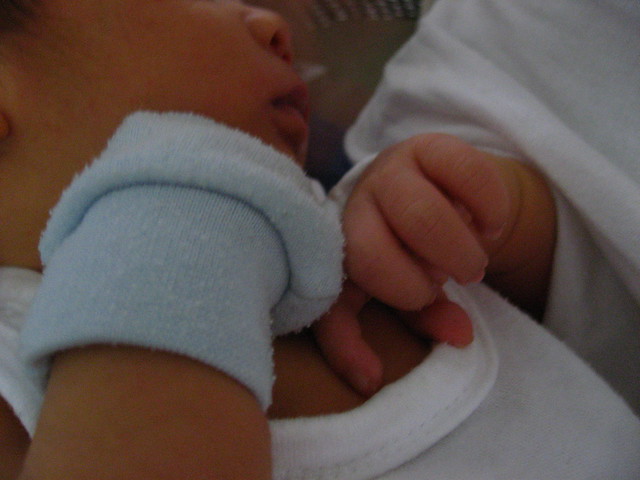The company will offer all employees globally — male and female — a minimum of 12 weeks paid leave during the first 12 months following the birth or adoption of their child. This benefit provides new parents with financial support and greater choice and flexibility in determining how they want to care for their child during the first 12 months, said the company.
“As part of our continued commitment to employee health and well-being, CA Technologies is pleased to announce the launch of this exciting new parent policy which will enhance our existing portfolio of family friendly benefits,” said Melinda Walsh, VP, People Business Partner, Asia Pacific and Japan, CA Technologies.
 |
| Baby wearing a mitten. |
“This new parent leave policy will assist to address the challenges faced by working families, providing support and enhancing the overall employee experience. We have a talented team within CA and we know that providing the right level of support during key milestones in their lives will help attract and retain the diverse, experienced workforce we have in Asia Pacific.”
This forward-thinking approach to employee work-life balance will help CA Technologies create a more inclusive culture and position the company as an employer of choice both among existing employees and when attracting new talent. All parents are supported by this policy, making it an attractive option for working mothers and fathers.
The new parent leave policy has already been launched by CA Technologies in the US and will now be rolled out worldwide. All employees will have access to a minimum of 12 weeks paid leave during the first 12 months following the birth or adoption of their child. Employees will be eligible for the new parent leave if they have 12 months of service at the date the child is born, or for adoptive parents where a child is matched or newly placed with them. Employees can opt for a shorter period of leave if they choose, and salaries and benefits will continue to be paid in the normal way.
In today’s digital economy, equality, diversity and inclusion have a vital role to play in business success as it can lead to increased productivity, greater innovation, higher employee retention and better risk management. Based on the 2017 Hays Asia Gender Diversity Report, at least seven in 10 respondents in the region believed that greater gender diversity would improve an organisation’s success. In addition, Asia Pacific companies in the top quartile for gender diversity on their executive teams are more likely to have above-average profitability, according to McKinsey’s The power of parity: Advancing women’s equality in Asia Pacific report.
On a macroeconomic level, the same McKinsey study found that supporting diversity in Asia Pacific could add US$4.5 trillion into the region’s collective annual GDP by 2025, a 12% increase over the business-as-usual trajectory. The economic impact presents a compelling case for driving greater gender diversity.
This new parent leave policy reflects the commitment of CA Technologies towards promoting work-life balance and an inclusive workforce. It is also part of a wider, multi award-winning talent management strategy to ensure the company’s employees have the skills needed for the future of work. These steps include leadership learning and development, unconscious bias training opportunities, targets for improving gender diversity outcomes, flexible working and other programmes to support family responsibilities.
One of the initiatives that CA Technologies has implemented in Asia Pacific requires the talent acquisition team to present at least two women in the shortlisted candidates for at least 75% of all job roles, as well as ensuring a diverse interview selection panel. These guidelines will help the company hire more multicultural women and increase the representation of women in technical roles.
“Despite the exponential change technology is making to society, diversity challenges remain across the technology industry which threatens the opportunity for continued innovation,” said Walsh. “This new parent leave policy is another example of how CA Technologies allows employees to balance their work and personal lives allowing for a diverse culture where ideas are openly shared and respected.”
CA already has family-friendly benefits. Global offerings include:
- Reimbursement for shipment of milk for travelling mothers
- Gift bundles for new babies and pets
= Five days leave for bereavement of immediate family member
- Time to care for a pet upon adoption or to grieve when a pet is lost

